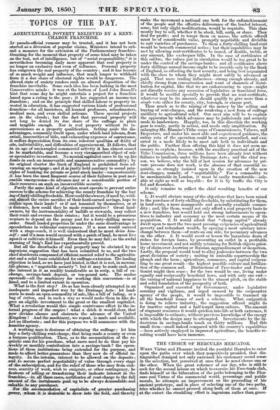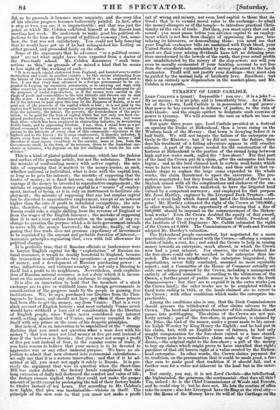THE CHOICE OF HERCULES MERCATOR.
WHEN Virtue and .Pleasure invited the youthful Hercules to enter upon the paths over which they respectively presided, that dis- tinguished demigod not only exercised his customary sound sense in the selection but perceived at once that he must choose one or the other. When the great reformer of our day, who is still to seek for the second labour on which to exercise his Free-trade club, finds him self at the bifurcation of the paths belonging to the Plea- sure and Virtue of the commercial world, percentage and public morals, he attempts an improvement on the proceeding of his ancient prototype, and in place of selecting one of the two paths, tries whether he cannot proceed along both of them at once. If at the outset the straddling effort is ingenious rather than grace- f-ul, as he proceeds it becomes more ungainly, , and the very idea of his ulterior progress becomes ludicrously painful. In fact, after a step or two, you see, it is impracticable: and that was just the point at which Mr. Cobden exhibited himself at the Russia loan meeting last week. Ile undertook to make good his political ob- jections to the loan on the ground of political economy • but, some- how, the feat was not satisfactory. You could not help fancying that he would have got on if he lad relinquished his footing on either ground, and proceeded fairly on the other.
Some of the arguments that he advances "as a political econo- mist" are not what might have been expected from a doctor of the Free-trade school Mr. Cobden denounces " such tran- actions as this," on grounds of so mixed a kind that he seems to lose sight of the working of each-
" It is so much capital abstracted from England, and handed over to entire destruction and waste in another country ; by this means abstracting from the labour of this country the means by which it is to be employed and to live. I say that every loan advanced to a foreign government to be ex- pended in keeping up enormous armaments, or in carrying out wars with other countries, is so much capital as completely wasted and destroyed for all the purposes of useful reproduction, as if the money were carried in the shape of goods and commodities to the mid Atlantic and thrown out to sink in,the water. I make no distinction whether the interest be paid or not ; for if the interest be paid upon this loan by the Emperor of Russia, it is not paid out of the proceeds of the capital which is lent ; it is not paid by the capital itself being invested in reproductive employments ; but it 18 extorted from the industry-, the labour, the poverty, the wretchedness of the popu- lation, to be kind for the loan of capital which has not only not been em- ployed productively, or been thrown to the bottom of the ocean, but worse than that—which has been employed in obstructing industry, in devastating fertile lands, and in oppressing freedom. I say, then, I stand here as a po- litical economist to denounce every such transaction as this, as being in- jurious to the interests of every elan of this community—injurious to the 'highest and to the lowest ; for it stops employment, it impedes industry, it draws away from this country the very sources of profitable labour ; and therefore it must injure everybody in the country, more or less, from the Government itself, in the form of its revenue, .down to the humblest me- chanic or labourer, who depends on his few shillings a week for his sub- sistence."
This is a kind of plated political economy, which has the fashion and surface of the genuine article, but not the substance. There is the mistake of confounding money with active capital; the mis- take of supposing that it matters to the money-lender, as such, whether national or individual, what is done with the capital lent, so long as he gets his interest i the mistake' of supposing that the lender of money, at a fixed interest, can derive some further ad- vantage if the money be invested in reproductive employment, the mistake of supposing that money capital is a "source " of employ- ment, instead of being, as it is, only an instrument to facilitate em- ployment; the mistake of supposing that any but surplus capital can be diverted to unproductive employment, except at an interest higher than the rate of profit in industrial occupations; the mis- take, therefore, of supposing that the lending of this money to Russia could take a single shilling from the revenue of England or from the wages of the English labourer ; the mistake of supposing that it is not a very serious innovation on the usages of any ex- change to question the purpose which a de facto government intends to serve with the moneyrowed ; the mistake, finally, of sup- posing that free trade does not presume expediency of investment to be regulated by the amount and probable duration of interest,— insurance principles regulating that, even with full allowance for political changes.
It is perfectly true, that if Russian officials or landowners were to borrow English capital for the " exploitation " of Russian na- tural resources, it would be doubly beneficial to England, because the transaction would involve two operations—a good investment of money, and a development of Russian purchasing power : a wise, industrious, and virtuous country, is not only a blessing to itself but a profit to its neighbours. incum-
bent such exploita- _tion of Russian natural resources is not a duty which it is on the members of any stock exchange to originate.
It is also an innovation to hold that the members of a stock exchange are to give or withhold loans to foreign governments in consideration of the progress made by the people in gaining free institutions. We, he says, purchased our liberties from the Plan- tagenets by loans, and should not have got them if those princes had been able to t the money, say from 'Venice. That is a very slack account of English history ; and most certainly Venice never ral would have withheld a loan out of consideration for the liberties of English people, since Venice never considered any interest worth setting against that of -Venice, and never scrupled to ally itself with any prince on the score of his despotic principles. But indeed, it is an innovation to be saandal•r ed at the "strange doctrine that you must not question at a man does with his money"; that you must not lend money at five per cent instead of four if the borrower is Russia; that you must not accept a profit of five per cent instead of four, in the regular course of trade if you have reason to believe that your money is to be devoted to aggressive war or any other immoral purpose. We have no ob- jection to admit that new element into commercial calculations— we only say that it is a serious innovation; and that if it be ad- mitted at all, you must not apply it solely to Russia. It is pre- oisely the argument that was in question when the Short-time Bill was under debate : the factory hands complained that the long extension of daily toil destroyed the comfort and value of life ; the factory owners replied that they could not make the proper amount of profit except by prolonging the toil of their factory hands to twelve instead of ten hours. But according to Mr. Cobden's new lights, that plea was imo1missible—vicious in itself. The principle of the new rule is, that you must not make a profit out of wrong and misery, nor even lend capital to those that do. Good; that is to extend moral rules to the exchange—to admit the money-changers as of the temple—to introduce practical Chris- tianity as the rule of trade. But then, you must carry that out all round : you must pause before you advance capital to an employ- ment which is not tree from charges of oppressing the poor, bru- talizing its labourers, or demoralizing them: you must see that your English exchequer bills are unstained with Dyak blood, your -United States dividends untainted by the wrongs of Mexico ; you mist see that your mining dividends have left no debasing prac- tiees unredeemed in the bowels of the earth, that your retail profits are unadulterated by the misery of the slop-sewer; nor will you even be morally exonerated if your banki g account be not free from the secondary contamination of money advanced to the harsh contractor. Profit will not justify your dealings—they must also be guided by the mutual help of brotherly love. Excellent : -but this is an entirely new dispensation in the market-place, and Mr. Cobden is its apostle.



























 Previous page
Previous page